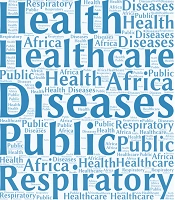Dear Editor,
Respiratory diseases pose a significant health burden worldwide, affecting millions and causing considerable morbidity and mortality (1). Respiratory diseases encompass a broad spectrum of illnesses, including acute infections like pneumonia and chronic conditions such as chronic obstructive pulmonary disease (COPD) and asthma (2). In recent years, there has been a concerning rise in respiratory diseases in African countries (3, 4), necessitating urgent attention from concerned agencies. The rising incidence of respiratory conditions and various environmental, social, and economic factors demand urgent attention from concerned agencies. As these countries face unique challenges in combating respiratory diseases, it is essential to foster collaborative efforts and implement targeted interventions to address the root causes and reduce the burden on affected communities.
Indoor and outdoor air pollution is crucial in exacerbating respiratory diseases in African countries (5, 6). Indoor air pollution, often caused by inefficient cooking methods and heating practices, disproportionately affects women and children who spend significant time in poorly ventilated spaces (7). Outdoor air pollution, driven by industrialization, transportation emissions, and other anthropogenic activities, further compounds the problem. Dust and smoke from deforestation, wildfires, and industrial sites also significantly contribute to poor air quality, impacting respiratory health (8). Additionally, the prevalence of tobacco smoking, including traditional practices like waterpipe smoking, is a significant risk factor for respiratory diseases, with thousands of deaths annually attributed to tobacco use in Africa (9-11). African countries are particularly vulnerable to the effects of climate change, and its impact on respiratory health is becoming more evident (12). Changes in weather patterns, extreme temperatures, and more frequent and severe droughts and floods can worsen respiratory conditions. Such climatic shifts may also foster the spread of vector-borne diseases, indirectly affecting respiratory health (13, 14). Inadequate access to quality healthcare services poses a significant challenge in effectively managing and treating respiratory diseases in African countries (15, 16). Health facilities may be scarce, especially in rural areas, leading to delayed diagnoses and inadequate treatment options for affected individuals. This limited access to care disproportionately affects vulnerable populations, including children, the elderly, and those with pre-existing health conditions.
Concerned agencies must take action to address the growing burden of respiratory diseases in African countries. Collaboration between national governments, international organizations, non-governmental organizations (NGOs), and local communities is vital in creating comprehensive strategies. Firstly, there is a need to strengthen healthcare infrastructure through investments in healthcare infrastructure, including establishing well-equipped health centers and training healthcare professionals (17), which will significantly enhance the diagnosis and treatment of respiratory diseases. Secondly, there is a need to raise public awareness about the causes, prevention, and management of respiratory diseases, which is crucial (4). Targeted campaigns can emphasize the importance of smoke-free environments, proper ventilation, and early healthcare-seeking behavior. Thirdly, there is a need for environmental protection by encouraging the adoption of cleaner energy sources, promoting sustainable urban planning, and implementing stricter emissions standards, which are necessary steps in mitigating the impact of air pollution on respiratory health (18). Lastly, there is a need for effective research and data collection because comprehensive data on the prevalence and risk factors of respiratory diseases in African countries are essential for evidence-based policymaking. Supporting research initiatives and data collection will enable better understanding and targeted interventions. The increasing burden of respiratory diseases in African countries demands immediate attention from concerned agencies. Combining efforts to address environmental, social, and healthcare challenges will be crucial in reducing the incidence and impact of respiratory conditions. With collaborative action and targeted interventions, it is possible to safeguard the respiratory health of communities across the continent, ensuring a healthier and more sustainable future for all.
